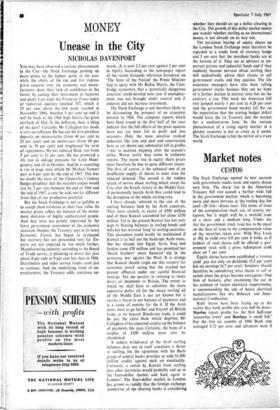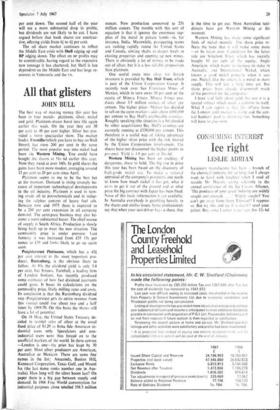Market notes
CUSTOS
The Stock Exchange opened its new account with government stocks weak and equity shares very firm. The sharp rise in the American -Treasury bill rate caused a further wide fall in the government market, which is becoming more and more nervous as the vesting day for steel-28 July—draws near. The terms of issue of the compensation stock are, of course, un- known, but it might well be a twofold issue of a short and a medium long. Under the Act the government stock issue has to be equal on the date of issue to the compensation value of the securities taken over. With War Loan at 501 to yield over 6.9 per cent it looks as if holders of steel shares will be offered a gov- ernment stock with a gross redemption yield
• close on 7 per cent.
Equity shares have now established a 'reverse yield' gap not only on dividends (5.3 per cent) but on earnings (6.7 per cent). Investors should therefore be considering what shares to sell or switch when the prices become outrageous. One firm of brokers, after examining the cut in the estimate of future electricity requirements, is recommending the sale of heavy electrical manufacturers like Am, Babcock and Inter- national Combustion.
Bank shares have been facing up to the reality that. bank profits this year will be down. Martins report profits for the first half-year `somewhat lower' and Barclays 'a small fall.' -For the first six months of 1966 Bank rate averaged 6.12 per cent and advances were 5
per cent down. The second- half of the year will see a more substantial drop in profits, but dividends are not likely to be cut. I have argued before that bank shares are unattrac- tive, offering yields from 4+ to 41 per cent.
The oil share market continues to reflect the Middle East crisis with Shell edging up and BP edging down. The effect on BP profits may be considerable, having regard to the expensive new tonnage it has chartered, but Shell is less dependent on the Middle East and has large re- sources in Venezuela and the us.







































 Previous page
Previous page